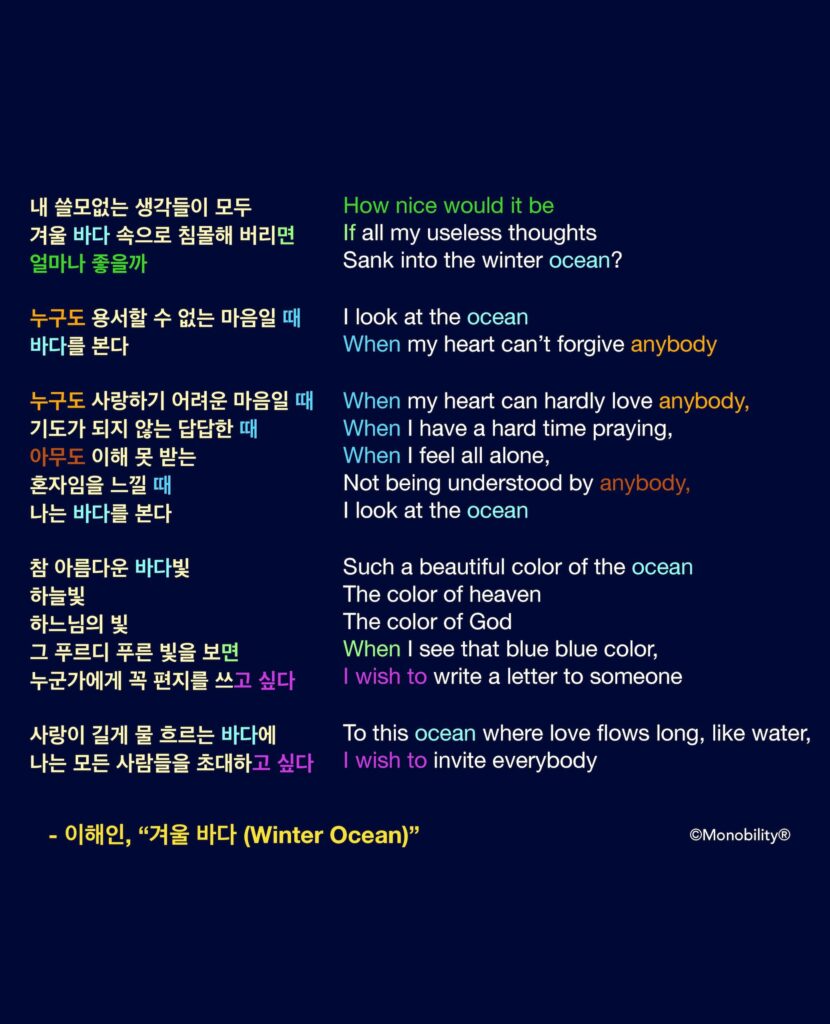English, among other languagues, uses the same word “When” for two different purposes, namely, i) when you ask questions, and ii) when you say a time-specifying clause. But in Korean, as with another set of languages, there are two different words for “when” for the two cases. This may pose a little challenge and cause a very common mistake for some beginners, until the following examples are understood clearly:
i) Interrogative Adverb: To ask questions, just say “언제”:
- 언제 이걸 다 했어? When did you do all this?
- 언제 돌아올 거야? When will you come back?
ii) Conjunction: To specify the time of action as a subordinate clause in the present tense, add “-ㄹ” or “-을” to the verb stem, and just say “때”:
- 혼자임을 느낄 때, 나는 바다를 본다 When I feel all alone, I watch the ocean. [ 느끼-다 to feel => 느끼 + ㄹ 때 = 느낄 때 When (I) feel …. , ]
- 너 점심 먹을 때, 나한테 얘기해. 같이 먹자. When you have lunch, tell me. Let’s eat together. [ 먹다 to eat => 먹 + 을 때 = 먹을 때 When (you) eat …, ]
In the above examples, “-ㄹ” is the particle (relative clause ending) for the verb stem ending with a vowel, and “-을” for the stem ending with a consonant. This phonetic rule applies to many other features of Korean particles. It just makes sense phonetically, because otherwise, the two consonants – the end of verb stem and “ㄹ” – would collide, and you wouldn’t know how to pronounce them, would you? ^^

쓸모없는 useless
생각 thought
겨울 Winter
바다 sea, ocean
속으로 into; 속 inside (noun) + 으로 to/towards = 속으로 into
침몰하다 to sink (boat, ship)
침몰해 버리다 to end up sinking [ (verb)-버리다 to end up … ing ]
(verb)-면 if;
-면 얼마나 좋을까 How nice would it be if … [ idiomatic ]
누구도 anybody [ used in a negative sentence ]
용서하다 to forgive; 용서할 수 없다 can’t forgive
마음 heart, mind
-ㄹ/을 때 when … [ conjunction ]
보다 to look, see, watch
사랑하다 to love; 사랑하기 어렵다 to be difficult to love [(verb)-기 어렵다 it’s difficult to … ]
기도 prayer;
답답하다 to be frustrated
아무도 = 누구도 anybody
이해하다 to understand; 이해 받다 to be understood; 이해 못 받다 to be not understood
혼자 alone, by oneself; 혼자이다 to be alone; 혼자임 being alone [ noun form of “혼자이다” ]; 혼자임을 [ accusative particle -을 ]
느끼다 to feel
참 really, very, very much
아름다운 beautiful
빛 light; [ (noun)+빛 color of (noun) = 빛깔 = 색깔 ]
하늘 sky, heaven
하느님 the Heaven; 하나님 God
푸른 blue; 푸르디 푸른 blue and blue [ (adjective)+디 emphatic expression for certain short adjectives ]
- 붉디 붉은 노을 red and red (crimson red) sky at sunset
- 맑디 맑은 물 clear and clear (crystal clear) water
누군가 someone; 누군가에게 to someone [ dative ]
꼭 certainly, definitely
편지 letter
쓰다 to write; 쓰고 싶다 to wish to write [ (verb)-고 싶다 to wish to … ]
길다 to be long; 길게 long [adverb]
물 water
흐르다 to flow
모든 every, all
사람들 people
초대하다 to invite; 초대 invitation
Check out our Facebook for much more:
All the photos were taken in Nazaré, Portugal.





